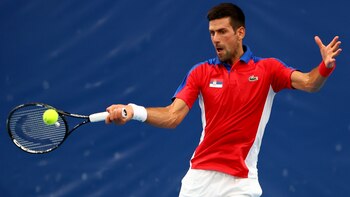Heat has begun to play a factor and an approaching tropical storm could also impact competitions in Tokyo.
Tropical storm Nepartak is headed straight for Japan and may and could make its presence known during the Games. A tropical depression formed on Friday morning, local time, north-northeast of Guam and the Mariana Islands, and has continued to gain strength, eventually becoming Tropical Storm Nepartak late Friday, local time.

As of midday Monday, local time, Nepartak had 10-minute sustained winds of 46 mph (74 km/h) and was moving north-northwest. The storm was centered hundreds of miles southeast of Tokyo and is expected to make a turn to the northwest, eventually impacting central and northern Japan.
“Enhanced rain, winds and rough surf will impact areas generally to the north of Tokyo, Monday night into Tuesday night, local time,” AccuWeather senior meteorologist Rob Richards said. “This will have some impacts on the Olympics ongoing in Tokyo.”
Gusty rain showers could continue to affect the Games thru Wednesday. Winds in Tokyo have already increased substantially on Monday.
Nepartak is not forecast to strengthen into a typhoon, however the southern edges of the storm could have impacts on events taking place in Tokyo, as well as some other events across central and northern Japan.
“Some rain will occur in Tokyo, but winds will not be an issue with them being sustained at 10-20 mph with gusts to 25 mph,” Richards said.
The impacts in Tokyo and its surrounding areas are forecast to be minor, whereas more rain is expected further north. Richards said overall, the impacts on the Olympics are “not a major situation.”
While significant delays of competitions are not expected, the storm could affect water sports, even causing danger, particularly to those in the ocean.
The surfing medal rounds have been moved forward from Wednesday to Tuesday, for competitors to take advantage of better waves ahead of the storm.
Rowing organizers have already rescheduled events due to inclement weather, from Monday to Sunday, while archery has also modified its schedule.
Beat the heat
The heat factor in Tokyo over the opening days of the Games has been manageable although not ideal, as temperatures have remained below 30 degrees Celsius, but with uncomfortable humidity. However, they are expected to rise to highs of 32 degrees or greater throughout the week.
Sunday’s men’s triathlon start had been moved up to 6:30 a.m, a decision already taken in December 2019 to combat Tokyo’s sweltering summer heat. Norwegian Kristian Blummenfelt won the event consisting of a 1500-meter swim, 40-kilometer bike and 10k run, in just over one-hour, forty-five minutes. The women’s race also began at 6:30 a.m. to beat the heat on Monday morning, as Dutch triathletes Maya Kingma and Rachel Klamer raced to gold and silver medals.

In his quest for the ‘Golden Slam’ Novak Djokovic discussed the challenging weather conditions following his first round victory over Bolivia’s Hugo Dellien on Saturday.
“Very tough - today, from also speaking to the other players, it was the hottest day so far,” Djokovic said. “Humidity is brutal, because it’s very hot and also very humid, so the hard courts absorb the heat, and it stays trapped in there.
“Not much wind, not much breeze. Maybe other days there was a bit more wind, which helped refresh and cool down, but not much today, so it was challenging definitely, but I’m pleased to overcome the first hurdle.”
Djokovic said he concurs with the suggestion by Russian Olympic Committee player, and world number two, Daniil Medvedev, about pushing the schedule back to later in the day.
“I agree with him 100% - I actually asked as well,” the Serbian said. “My team captain Viktor Troicki was speaking to the referee a couple of times. To be honest, I don’t understand why they don’t start matches at, say, 3pm.

“I’ve heard for tennis there is some kind of curfew they have to finish at midnight, but if that’s the case, I’ve just finished the last match and it’s not even 5pm, we still have 7 hours to play. They have lights on all the courts, they’re going to make life much easier for all of us tennis players, I just don’t understand why they don’t move it.”
U.S. skateboarder Nyjah Huston said hot weather affected runs at the Ariake Urban Sports Park.
“It really does - It really makes a difference,” said Huston, who finished seventh in Sunday’s street final. “Your feet start burning out, it feels kinda crazy. It gets so hot that your board kinda flexes. It’s not easy.”
Chilean beach volleyball player Marco Grimalt also said conditions were tough after his match.
“Very high temperatures, lots of humidity too,” Grimalt said. “Generally, we’re used to playing with this heat. We had one week of adaptation, and in the end it’s the same conditions for everyone.”
U.S. volleyball two-time Olympic medalist April Ross said the team’s preparations before traveling to Tokyo have paid off.
“We’ve done a lot of training at home to try and be ready for the heat,” said Ross. “We use a lot of sauna training, we went and did a training camp in some heat and humidity, and we got here pretty early and we’re training in hot parts of the day.
“It still feels hot, but I feel like we’re a little bit more ready for it than we would be (otherwise).”
Follow Brian on Twitter - @Brian_Pinelli
Últimas Noticias
Sinner-Alcaraz, the duel that came to succeed the three phenomenons
Table tennis: Brazil’s Bruna Costa Alexandre will be Olympic and Paralympic in Paris 2024

Rugby 7s: the best player of 2023 would only play the medal match in Paris

Rhonex Kipruto, owner of the world record for the 10000 meters on the road, was suspended for six years

Katie Ledecky spoke about doping Chinese swimmers: “It’s difficult to go to Paris knowing that we’re going to compete with some of these athletes”





